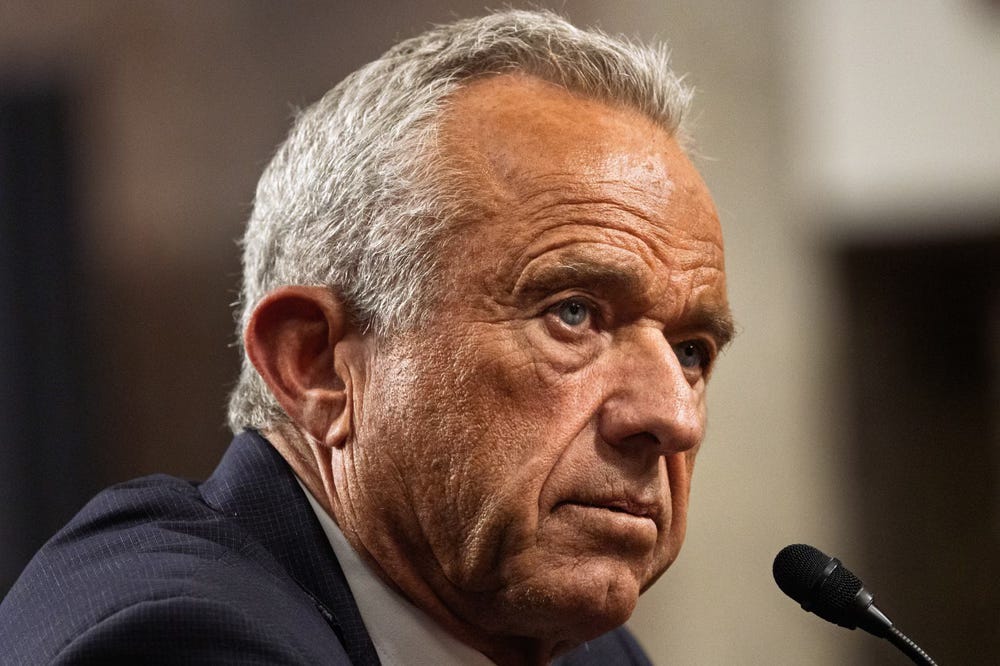Sunday Essay: The Erosion of Public Health
Or what happens when you appoint a snake oil salesman to lead the whole effort....

This week’s essay sets the tone for a series of personal reflections—on books that moved me, movies that left me speechless, or topics I feel compelled to wrestle with. Given the Senate hearings this week, I thought it was especially timely to pause my usual creative focus. I’ve been plugging A Boy’s Own Story in Notes and on social media, but today felt like the right moment to address something heavier: public health, and what we’ve done to it.
As some of you know I spent over two decades in hospital leadership. This morning I woke up to a tweet about an active TB case confirmed at a nearby high school and it put me in mind of a story from one of my hospitals. Years ago, we had a local resident with active tuberculosis who refused quarantine during treatment. When an active TB case is identified, a literal army of local and state public health officials act quickly to neutralize further spread. In this case, her friends and neighbors kept spotting her in Walmart, at church, all over town. Concerned for thier own safety, they would report every sighting. Eventually, a judge ordered her confined to the hospital, where she stayed under the watch of a sheriff’s deputy for months. To me, her case is a stark reminder that sometimes personal freedoms must be limited to protect everyone else. That tension—between individual liberty and collective health—is the heart of our current crisis.
Once, America’s public health institutions—the CDC, NIH, FDA, CMS, as well as state and local health departments—were the envy of the world. We trusted that science and medicine could handle almost any threat. But in a generation, they’ve gone from respected guardians of health to targets of partisan warfare. The COVID-19 pandemic didn’t create that trend, but it exposed it. Agencies bent under political interference, and public trust cracked.
Donald Trump and his imitators didn’t invent hostility to public health, but they perfected it. Their gospel of hyper-individualism and performative toughness sneers at the caution and collaboration on which public health depends. The message is simple: no one can tell me what to do. It plays well at rallies, but it corrodes the institutions that keep communities safe.
The CDC has taken the hardest blows. Just this year, former director Susan Monarez was fired after only 29 days by RFK Jr., who pressured her to endorse scientifically unsupported vaccine policies. More than 1,000 current and former HHS employees have condemned the move, but the damage is done: political litmus tests now trump science.
History warns us this isn’t new. During the AIDS crisis, the CDC was blasted for its slow, inadequate response. ACT UP and other activists—Larry Kramer most famously—denounced the bureaucracy that allowed thousands to die while politicians hesitated. Randy Shilts chronicled it in And the Band Played On (Bookshop link) (Amazon link). Public health didn’t change because leaders suddenly grew wise. It changed because communities forced them to.
Dr. Anthony Fauci embodies that evolution. Once vilified by AIDS activists, he eventually engaged, listened, and transformed. He broadened clinical trials, accelerated research, and secured more funding. By the time of COVID, he was a trusted voice, proof that public health institutions can adapt when they stay rooted in science and responsive to people.
Operation Warp Speed—whatever one thinks of the politics—was a triumph on the scale of penicillin or the polio vaccine. Under different leadership, it might have been remembered as a unifying national achievement. Instead, the same administration that launched it undermined it, unable to reconcile its success with their own ideology. The result: vaccine myths flourished, and trust withered.
And now the consequences are here. Measles and whooping cough are back. Vaccination rates slide. Communities once protected by herd immunity are exposed. The most vulnerable—children, the elderly, the sick—pay the price.
We’re at a fork in the road. Either we recommit to robust, trusted public health institutions, or we watch preventable disease creep back into everyday life. This isn’t about whether vaccines cause autism (they don’t, and never did). It’s about whether we want to live in a society that values the health of its people—or one that mistakes stubborn defiance for freedom.
The choice is ours, but the cost of getting it wrong will be measured in lives.
Further Information and Reading
- Susan Monarez’s critique of RFK Jr.'s CDC politicization: Read about it here
- CDC's historical response to AIDS and grassroots queer activism: CDC Museum
- Dr. Anthony Fauci's transformation influenced by AIDS activism: The New Yorker
- History of AIDS activism and its impact on public health policy: ACT UP
- Randy Shilts, And the Band Played On (Book): Amazon | Bookshop.org
- And the Band Played On (Film): Streaming on Max
Or available for purchase on Amazon Video
Disclosure: Links provided may be affiliate links, from which I earn a small commission at no extra cost to you.
Enjoyed this post? Check out more of my favorite books and recommended reads at my Bookshop.org store. Your purchase helps support local bookstores.Stay Connected
📖 Subscribe to Line & Verse for weekly chapters and essays.
📸 Follow along on Instagram: @caleb_writes
🧵 Join me on Threads:
📘 Facebook: Caleb Reed


